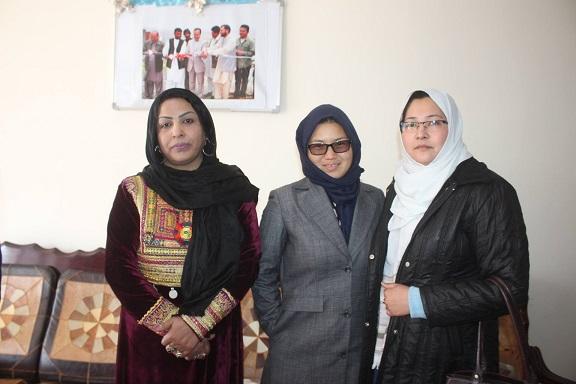KABUL’s lives in central Maidan Wardak province, but the election of three women to lead the Provincial Council has raised hope for a positive change.
For the first time in Afghanistan, three women were elected to top administrative posts by the Provincial Council of Maidan Wardak province on Saturday.
The elected provincial public representatives voted on Saturday to elect the council’s new administrative board. The 15-member council elected all three female members in the body as head, deputy head and secretary.
According to Maidan Wardak media office, Halima Askari and Dr. Asmatullah Asim vied for the slot of the council’s head while Nasifa Selai Wardak and Sharifullah Hotak eyed the deputy head position.
Halima Askari collected nine votes from the present 13 members, winning the contest while Selai Wardak obtained eight votes and was elected as deputy head.
Hajira Mirzai was elected unopposed as secretary of the provincial council. All members of the council voted for Mirzai.
According to the Independent Directorate of Local Governance (IDLG), 37 percent of candidates making it to the provincial council leadership board were women in this year’s elections.
Maidan Wardak Women’s Affairs Director Wahida Khkuli says women face many problems in the province, but their situation is improving with the passage of time.
In an exclusive interview with Pajhwok Afghan News, Khkuli said 550 women worked in public and private organizations in Maidan Wardak and the women’s affairs department was entirely managed and led by women.
She added there were 316 female teachers in the province and their contribution had a positive impact on the key sector.
“There is fortunately no shortage of midwifes in the province”, Khkuli added, but complained about women’s lack of interest in government or private job after completing vocational trainings her department offered due to cultural restrictions.
“It is encouraging that the provincial council of Maidan Wardak has elected women to leadership posts for the first time, it may bring positive changes in women’s situation,” she said.
Pointing to women’s problems, she said: “Family problems exist, for example, a person if lives in Kabul lets his/her daughter to get education but people live in provinces do not allow their daughters to go to educational centers due to security problems and lack of facilities.”
About cultural activities of her own department, she said she formed the Village Sisters Movement and she was trying to continue publication of Pizwan monthly journal.
On the other hand, Nafisa Seli, the newly elected deputy provincial council head of Maidan Wardak province, said no progress could be achieved in with regard to improving women’s lives in the province.
She said she received many congratulation messages from rural women and villages after her election as deputy head of the provincial council.
“Our goal is to take out women of cultural barriers and support their rights, we want fundamental changes in women’s situation in this province,” Seli said.
Besides other problems, insecurity has a negative impact on women’s situation, she said, adding only a limited number of women worked in government offices.
Suhaila Spesali, a resident of Maidan Shahr city, who works in a government organ, also said women were paid less attention in the province.
However, she said hopes about women’s situation raised after three women were elected to the leadership board of the provincial council.
“This election would positively change women’s situation and would reduce violence against the gender,” she said.
She cited insecurity and bad traditions as major problems of women but said fortunately some improvement had recently been made. “But this change is limited to the provincial capital and women’s situation in rural areas is yet to improve.”
Violence against women, their lack of access to judiciary organs and lack of trust in such organs were other problems in the province.
Wahida Khkuali said violence against women was common in the province but such incidents often went unreported due to insecurity and cultural restrictions. A major reason of violence against women is illiteracy among women.
Wahida Khkuali said there no problem for women in judiciary organs but lack of awareness, fear, family problems, insecurity and cultural restrictions discouraged women to approach the judiciary.
“We on average register 15 to 25 cases of violence against women in the province annually, we share these cases with judiciary organs but women do not follow them because the organs are entirely run by men,” she said.
Nafisa Seli said: “I can surely say that the number of cases of violence against women is higher in Maidan Wardak than any other province. Here women are deprived of their Islamic rights and prevented from working and education.”
Muska Mayar, a civil society activist, said women’s role in government offices was symbolic in Maidan Wardak. A few women who work in government offices are conservative and create problems for other women.
“The provincial council plays the role of a medium between the government and the people. In leadership role, women can better hear women’s problems and defend their rights,” she said.
The women’s affairs director asked other women to force their family leaders to pay attention to their children’s education, particularly girls.
mds/ma








GET IN TOUCH
NEWSLETTER
SUGGEST A STORY
PAJHWOK MOBILE APP